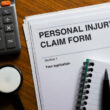If you’ve been in a car accident and suffered physical injuries, you may be eligible to file a bodily injury claim. This type of claim is a request for compensation for expenses related to the injuries you sustained in the accident.
Bodily injury claims usually cover medical bills and lost wages, and these claims can be paid by either your insurance company or the at-fault driver’s insurance.
Let’s find out all there is to know about bodily injury claim, including it’s processes and consequences.
Understanding Bodily Injury Claims
If you have been injured in a car accident, you may be entitled to financial compensation through a bodily injury claim. Here’s what you need to know about filing a bodily injury claim and what happens after you file.
What is a Bodily Injury Claim?
A bodily injury claim is a request for compensation for expenses related to physical injuries sustained in a car accident.
These expenses can include medical bills, lost wages, and even funeral costs, if applicable. Bodily injury claims can be paid by either the injured party’s insurance company or the at-fault driver’s insurance company.
How is a Bodily Injury Claim Filed?
To file a bodily injury claim, you will need to contact your insurance company or the at-fault driver’s insurance company. You will need to provide evidence of the accident, including any police reports or witness statements. It is important to file your claim as soon as possible to ensure that you receive the compensation you are entitled to.
Furthermore, you’ll need to provide documentation of your medical bills, lost wages, and any other expenses related to your injuries.
Who Can File a Bodily Injury Claim?
If you have been injured in a car accident due to someone else’s negligence, you may be eligible to file a bodily injury claim. This includes passengers, pedestrians, and bicyclists who were injured in the accident. It is important to note that if you were at fault for the accident, you may not be eligible to file a bodily injury claim.
What is the Importance of Filing a Bodily Injury Claim?
Filing a bodily injury claim is important because it can help you receive the financial compensation you need to cover medical bills, lost wages, and other expenses related to the accident.
It can also help you hold the at-fault driver accountable for their actions and prevent similar accidents from happening in the future.
What Happens After Filing a Bodily Injury Claim?
After filing a bodily injury claim, an insurance adjuster will review your claim and determine the amount of compensation you are entitled to.
They may also negotiate a settlement offer with you or your attorney. If a settlement cannot be reached, you may need to file a lawsuit to receive the compensation you deserve.
It is important to note that bodily injury claims are subject to bodily injury limits, which are the maximum amount an insurance company will pay out for a bodily injury claim.
If your expenses exceed these limits, you may need to seek additional compensation through other means, such as collision coverage or uninsured/underinsured motorist coverage.
Filing a bodily injury claim can be a complex and time-consuming process. It is important to work with an experienced personal injury lawyer who can help you navigate the process and ensure that you receive the compensation you deserve.
Medical Care and Expenses
It’s also relevant to explore the medical care and expenses involved when it comes to bodily claim injuries.
What Medical Expenses are Covered?
When you file a bodily injury claim, the medical expenses that are covered depend on the type of coverage you have. Bodily injury liability coverage helps pay for the medical expenses of the other driver and their passengers if you are at fault for the accident.
Personal injury protection (PIP) coverage helps pay for your own medical expenses, regardless of who is at fault. Medical payments coverage (MedPay) helps pay for the medical expenses of you and your passengers, regardless of who is at fault.
Medical expenses that may be covered include hospital visits, doctor visits, surgery, medication, rehabilitation, and other necessary treatments. However, it’s important to note that there may be limits to the amount of coverage provided, so be sure to check your policy for details.
How are Medical Bills Paid?
After an accident, you may receive medical bills from various healthcare providers. In some cases, the healthcare provider may bill your auto insurance company directly.
In other cases, you may need to pay the bills upfront and then submit them to your auto insurance company for reimbursement.
If you have PIP or MedPay coverage, your auto insurance company may pay the medical bills directly. However, if you have bodily injury liability coverage, the other driver’s insurance company may be responsible for paying the medical bills.
What Happens if Medical Care is Ongoing?
If you require ongoing medical care as a result of an accident, your auto insurance company may continue to pay for your medical expenses.
Moreover, there may be limits to the amount of coverage provided, so be sure to check your policy for details.
If your injuries are severe and you are unable to work, you may also be eligible for disability benefits through your auto insurance policy or through a separate disability insurance policy.
You need to keep all of your medical records and bills organized and to keep your auto insurance company informed of your ongoing medical care. This will help ensure that your medical bills are paid in a timely manner and that you receive the care you need to recover from your injuries.
Loss of Income and Other Financial Losses
When you file a bodily injury claim, you may be entitled to compensation for lost income and other financial losses that resulted from the accident. These losses can have a significant impact on your financial stability, so it’s important to understand how they are calculated and what expenses are covered.
How is Lost Income Calculated?
If you were unable to work due to your injuries, you may be entitled to compensation for lost wages. This includes both the income you lost while you were unable to work and any future income you will lose as a result of your injuries.
The amount of compensation you receive for lost income will depend on several factors, including your salary or wages, the amount of time you were unable to work, and your future earning potential.
To calculate your lost income, your attorney will typically request documentation from your employer, such as pay stubs and tax returns, to determine your pre-accident income.
If you are self-employed or have irregular income, your attorney may use other methods to calculate your lost income, such as examining your past income tax returns or consulting with financial experts.
What Other Financial Losses Are Covered?
In addition to lost income, you may be entitled to compensation for other financial losses resulting from the accident. These losses can include:
- Medical expenses, including hospital bills, doctor’s visits, and medication costs
- Property damage, such as damage to your vehicle or other personal property
- Funeral costs, if the accident resulted in a wrongful death
- Disability or disfigurement, which can impact your ability to work or perform daily activities
- Pain and suffering, which refers to the physical and emotional distress you experienced as a result of the accident
It’s important to keep track of all expenses related to the accident, including receipts, bills, and invoices. Your attorney will use this documentation to help determine the amount of compensation you are entitled to receive.
Property Damage Claims
If you’ve been in a car accident and your vehicle or property has been damaged, you may be able to file a property damage claim with your insurance company. Here’s what you need to know about property damage claims.
What is Property Damage?
Property damage refers to any damage caused to someone else’s property, such as their vehicle or personal belongings, as a result of a car accident that you caused. Property damage can also include damage to buildings, fences, or other structures.
What Happens if There is Property Damage?
If there is property damage as a result of a car accident, you should exchange insurance information with the other driver and take photos of the damage. You should then contact your insurance company to report the accident and file a property damage claim.
How is Property Damage Claimed?
To file a property damage claim, you will need to provide your insurance company with information about the accident, including the date, time, and location of the accident, as well as the names and contact information of any witnesses. You will also need to provide photos of the damage and a copy of the police report if one was filed.
What is Property Damage Liability Coverage?
Property damage liability coverage is a type of car insurance that covers damages you may cause to someone else’s property in an accident. This coverage is typically required by law and is included in most car insurance policies.
What is Covered Under Property Damage Liability Coverage?
Property damage liability coverage typically covers damages to other vehicles, buildings, fences, and other structures. However, it does not cover damages to your own vehicle or property. If you want coverage for your own vehicle, you will need to purchase collision coverage or comprehensive coverage.
How do you calculate the value of your bodily injury claim?
Calculating the value of your bodily injury claim can be complex and depends on a variety of factors. These factors include the severity of your injuries, the amount of medical treatment required, and the impact of the injuries on your daily life.
Just know that you have work with an experienced personal injury attorney who can help you navigate the claims process and ensure you receive the compensation you deserve.
Personal Injury Claims
Personal injury claims are somewhat related to bodily injury claims and it’s vital that you get the basic information about them.
What is Personal Injury?
Personal injury refers to any physical or emotional harm that someone suffers due to the negligence or intentional actions of another person. It can include things like pain, suffering, emotional distress, and lost wages.
What is Covered Under Personal Injury?
Personal injury claims can cover a wide range of damages, including medical bills, lost wages, and pain and suffering. If you have been injured due to someone else’s negligence, you may be entitled to compensation for these damages.
What is Personal Injury Protection?
Personal Injury Protection (PIP) is a type of insurance coverage that can help pay for medical expenses and lost wages if you are injured in an accident. PIP coverage is typically required in no-fault states, but it may also be available in other states as well.
What is the Importance of Personal Injury Claims?
Filing a personal injury claim is important because it can help you recover the compensation you need to pay for medical bills, lost wages, and other expenses related to your injury. It can also help hold the responsible party accountable for their actions.
How is Personal Injury Proven?
In order to prove a personal injury claim, you will need to provide evidence that shows the other party was negligent or responsible for your injuries. This may include medical records, witness statements, and other documentation.
What is the Role of an Attorney in Personal Injury Claims?
A personal injury attorney can help you navigate the legal process and ensure that you receive the compensation you deserve. They can also help you gather evidence and negotiate with insurance companies on your behalf.
What is the Importance of Evidence in Personal Injury Claims?
Evidence is crucial in personal injury claims because it can help prove your case and show the extent of your damages. This may include things like medical records, witness statements, and other documentation. Remember, if you have been injured due to someone else’s negligence, it is important to seek legal help and file a personal injury claim to ensure that you receive the compensation you deserve.
Conclusion
Now that you understand what happens when you file a bodily injury claim, you can take the necessary steps to protect your rights and get the compensation you deserve. Remember, it’s important to gather as much evidence as possible, including photos, witness statements, and medical records. This evidence can help prove your case and increase the likelihood of a successful claim.
When filing a bodily injury claim, it’s important to work with an experienced personal injury attorney who can help guide you through the process. They can help you understand your rights, negotiate with insurance companies, and advocate on your behalf in court if necessary.
It’s also important to keep in mind that the amount of compensation you receive will depend on a variety of factors, including the severity of your injuries, the extent of your medical expenses, and the impact on your quality of life. Your attorney can help you calculate the value of your claim and work to ensure that you receive fair compensation.
Finally, it’s important to be patient and persistent throughout the claims process. It can take time to gather evidence, negotiate with insurance companies, and reach a settlement or verdict. But with the right legal team by your side, you can feel confident that you are taking the necessary steps to protect your rights and get the compensation you deserve.
YOU SHOULD ALSO READ:
- Road Traffic Personal Injury Claims: A Comprehensive Guide
- Can You Get Legal Aid for Personal Injury Claims? Explained
- Personal Injury Claim Medical Examination: What to Expect and How to Prepare
- Personal Injury Claim: What You Need to Know About Broken Ankle Cases
- Personal Injury vs. Medical Negligence: Understanding the Key Differences












